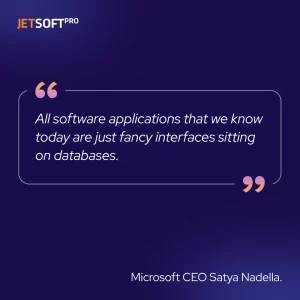Recently, the tech industry was shaken by a bold statement from Microsoft CEO Satya Nadella, challenging the very foundation of the Software as a Service (SaaS) model. Nadella suggested that traditional business applications, as we know them, will soon be replaced by intelligent agents and the SaaS is dead.
This announcement has raised crucial questions: Is SaaS on the way out? What would such a shift mean for the software industry, developers, and businesses?
In this article, we’ll delve into the details of this explosive prediction, analyze whether it holds any truth, and explore what it could mean for the future of technology.
What is Software as a Service (SaaS)?
Let’s begin by understanding the traditional SaaS model to better grasp the context of the discussion ahead.
Software as a Service (SaaS) is a cloud-based delivery model that provides software applications over the internet, allowing users to access them via a subscription. Unlike traditional software, which requires local installation and maintenance on individual devices or servers, SaaS eliminates these complexities by hosting applications on the cloud. This approach ensures seamless updates, scalability, and reduced IT management.
Common SaaS examples include widely used tools like email, calendaring, and productivity suites such as Microsoft Office 365.
SaaS has already fundamentally transformed the software industry by democratizing access to advanced tools, enabling businesses of all sizes to leverage powerful applications without the need for significant upfront investment or infrastructure. But is this revolution coming to an end?
The CEO’s bold statement: What did Satya Nadella mean by “Saas is dead”?
In December 2024, Microsoft CEO Satya Nadella joined the BG2 podcast with Brad Gerstner and Bill Gurley, where he predicted that traditional business applications would soon collapse.
Nadella explained that current business applications — such as CRM systems, ERPs, project management tools, and collaborative workspaces — are built around CRUD (create, read, update, delete) databases with embedded business logic. While these SaaS tools are essential to today’s business operations, Nadella suggested that their model is becoming outdated in the age of AI. He believes that business logic will be shifted to an AI layer.

Rather than relying on multiple distinct applications for different tasks, AI agents will manage these rules and processes across multiple databases, automating functions across systems. This approach would eliminate the need for traditional backend systems, as AI agents would interact directly with data and logic, streamlining operations and improving efficiency.
For example, imagine a project manager needs to track team progress, assign resources, and update stakeholders. Today, they would rely on separate tools like project management software, resource planning systems, and email for communication. In the future, an AI agent could handle all of these tasks automatically with just a simple command.
READ: AI for Business Automation: 9 Best Ideas
2025: The year of infinite memory
Satya Nadella’s prediction that SaaS tools will be replaced by AI agents is poised to accelerate with the advent of near-infinite memory by 2025. This breakthrough will allow AI systems to store and recall vast amounts of data, offering personalized, continuous user experiences by remembering past interactions. Coupled with expanded context windows that enable AI to process millions of data points simultaneously, these advancements will streamline business operations.
AI will provide coherent, data-driven insights, eliminating fragmented tools and enhancing efficiency across business processes.
Microsoft’s shift from traditional SaaS to AI-driven business operations
Microsoft is leading this transformation in the software industry by shifting business logic to an AI layer, reducing reliance on traditional backends. A key example of this shift is the integration of Python into Excel. With AI at its core, Excel evolves beyond traditional data analysis, enabling autonomous planning and task execution with minimal manual input.
In this model, Copilot acts as an intuitive user interface (UI) for interacting with AI agents, automating processes across platforms and streamlining workflows.
READ: What Is Automated Software Engineering
SaaS is dead: What does this shift mean for the tech industry?
The shift from traditional SaaS applications to AI-driven business operations will redefine how businesses use software, from the tools they rely on to the roles of developers and IT teams.
For developers, the shift represents both an opportunity and a challenge. Instead of building isolated SaaS applications, developers will need to create intelligent systems. Investing in AI and data-centric skills and adapting to agent-oriented solutions will be essential for staying relevant in this evolving landscape.
For businesses, this shift demands a reimagining of IT strategies, a focus on AI integration, and investment in the skills required to optimize and manage these advanced systems.
Small and medium-sized businesses, in particular, stand to gain from this evolution. The democratization of AI unlocks access to advanced capabilities that were once limited to large enterprises.
However, this evolution also raises significant security concerns. As AI systems become central to business operations, they present new vulnerabilities. Cybersecurity threats, such as data breaches, AI model manipulation, and unauthorized access to AI agents, could have far-reaching consequences. Businesses must prioritize securing AI pipelines, ensuring robust encryption, and implementing safeguards to protect sensitive data.
READ: Cybersecurity for employees in 2024-2025
SaaS is dead? Here is or take
At JetSoftPro, we see Satya Nadella’s prediction as a sign of evolution, not the death of SaaS. The future of SaaS lies in integrating AI to create smarter, more autonomous solutions that enhance software and automate tasks across systems.
With our deep expertise in AI, we’re here to help businesses navigate this shift and stay ahead in the era of intelligent software.

